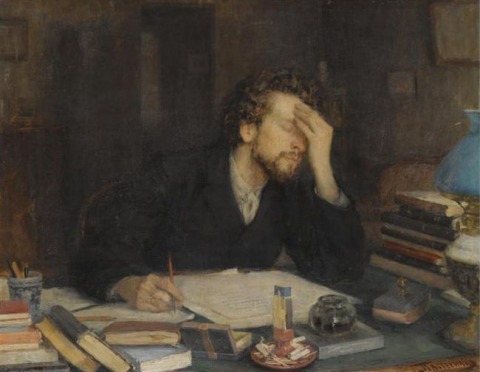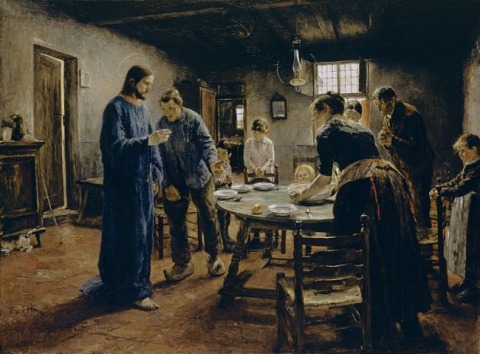
The Underground Thomist
Blog
Endzone CelebrationWednesday, 12-02-2015
Yes, there are still exhilarating moments in teaching. This week I gave students my personal end of the semester questionaire. It includes the query, “Courses like this are supposed to stretch you, so what would you say is the biggest way that you’ve been stretched?” As you might imagine, some of the replies were encouraging, others weren’t. But one student answered, “Arguing about the arguments of others is more challenging than arguing about your own arguments.” When I read that discovery, I wanted to spike the ball.
|
Theory of LaughterTuesday, 12-01-2015
We laugh at all sorts of things besides jokes. The most popular explanation is that laughter arises from the perception of incongruity. Maybe so, but I think there is more to be said. In the first place, some incongruities are more laughable than others. Have you noticed how much laughter arises just from the mismatch of level – from incongruity between the glorious and the base, the lofty and the low? For instance, someone may laugh because things turn out to be more wonderful than he had expected: “When the Lord restored the fortunes of Zion, we were like those who dream. Then our mouth was filled with laughter, and our tongue with shouts of joy.” On the other hand, someone lofty may laugh because of the follies of those beneath him: “Why do the nations conspire, and the peoples plot in vain? ... He who sits in the heavens laughs; the Lord has them in derision.” Congruities and incongruities also come in layers. The laughing cynic says “That was worse than I expected – but after all, I expect to find things worse than I expected!” Yet I’m not convinced that even layered incongruity catches all of the causes of laughter. For don’t we sometimes laugh from bleak bitterness? “Just as I thought, there’s no justice!” Or from sheer exaltation? “It’s just as lovely as I had expected!” Laughter of these kinds seems to erupt from the perception of congruity, not of incongruity – from a match, not a miss. Back to the drawing board. In the meantime, as to you cavilers, carpers, and crabs of condescension who ask, “Doesn’t it miss the point of laughter to theorize about it?” To you I say, “Ha!”
|
Reading and WritingMonday, 11-30-2015
I try to reserve Mondays for student letters. This student writes from Belgium.Question:I have two rather general and methodological questions: First, even though I’m entering a Master’s level program, I actually haven't had much experience writing essays. I’ve read some "How To" books on the subject, but I still feel a bit confused. How do I prepare to write the essay? How do I structure it? What makes an essay a good one? Second, even though I have a good grasp of history of philosophy, I feel like missing some essential tools for reading philosophical texts. As if I was lacking the capacity to ask the deeper questions in order to understand the hidden nuances. As if there was always a sort of underlying context or dynamics I don't see. Would you have any suggestions in this regard? Reply:Have you read A.G. Sertillanges, The Intellectual Life? It is a wonderful book, and I’ll bet it’s a lot different than the “How To” books you’ve been reading. If you haven’t read it already, I would recommend dropping everything and reading it right away. But now let me turn to your questions. As to your question about writing, I think the biggest mistake most students make is to think that their task is to “research” an interesting “subject.” An unlimited number of things can be said about most subjects, so if you take this approach you will never be able to know when you are finished. Your task isn’t to “discuss” a subject. It’s to do something about the subject, something that adds to our knowledge. Usually, that means framing and answering a question about it. Sometimes it might mean framing and solving a puzzle about it. It may also mean trying to demonstrate a claim about it which you have good reason to think may be true, or trying to refute a claim about it which you have good reason to think may be mistaken. Framing the question provides your preparation; answering it provides your structure; and a good essay is one that answers it well and truly. At least half of your work will usually lie in framing it. Unless you discover in the middle of composing the essay that you’ve framed it badly, that half will take place before you even set pen to paper. But suppose you do discover midway that you’ve framed it badly; it is confusing you and leading you down blind alleys. Don’t despair. Just go back and re-frame the question, and this time get it right. After all, if you’ve misframed your question, isn’t it better to find that out than to fail to find it out? Besides, discovering that some important question has been misleadingly framed is one of the main ways that philosophy advances. Now for your question about reading. The first thing to realize is that the thinkers whom you will be studying were doing the same thing that I’ve just been telling you to do. In other words, they weren’t trying to “research” a “subject,” but to frame and answer important questions about it. So before all else, try to discern what questions a writer is asking, how he frames them, and why he frames them just that way. Then, before asking what you call the deeper questions, try to understand your own deeper assumptions. Unfortunately, we often make assumptions we don’t realize we are making, then read as though the author is making them too (even if he isn’). Ever since Descartes, for example, many philosophers have proceeded as though we must doubt everything, and test the instrument of knowing, the mind, before we put it to work to know anything about reality. If you try to read someone like Aristotle or Thomas Aquinas as though they were trying to do the same thing, you will misunderstand what they are up to, because they would have considered this procedure backwards. In their view, one has to know something about the world even in order to test the instrument of knowing! The way to find out the mind’s weaknesses is to compare one’s thoughts to what is. One of the biggest mistakes we can make in reading is to suppose that we already know all the answers. For instance, suppose you take for granted that everything some thinker of an earlier time says about women is in need of “critique from a feminist perspective.” This may prevent you from discovering that he actually provides a critique of the feminist perspective. What a disaster to be so locked up in our little island of time and culture that we can’t think any thoughts except those we have thought before! Of course I am not suggesting that you can’t disagree with a thinker of another place and time. What I do say is that you should let him speak first. Assume that he might know something! Give him a chance to change your mind! If you take that last point seriously, you will try to enter into conversation with the thinker, and I don’t mean just a social chat. Remember what philosophical conversation is for! As G.K. Chesterton said, “Merely having an open mind is nothing. The object of opening the mind as of opening the mouth is to shut it again on something solid.” It doesn’t matter how many centuries ago the thinker you are studying was writing -- reach out with your intelligence. And don’t just ask him questions and try to discern how he would answer -- “What do you mean by that?” “Why do you think that it’s true?” “How would you reply to such and such an objection?” You should also submit humbly to the questions he would ask you, and try to discern what he would think of your answers. As you acquire these habits, you may find that you are reading more and more slowly. That’s perfectly all right, because this sort of reading cannot be hurried. One may even have to creep along line by line, perhaps something like this. Finally, you might find it helpful to outline the arguments of the work you are reading -- not his beliefs, but his reasons for believing his beliefs. Don’t outline while you are reading, though; first read, then outline. In fact, you should probably read the work several times before attempting to outline its arguments. I won’t say any more about analytical outlining here, though, because I discuss it elsewhere. Since man as a rational creature is ordained to seek and know the truth of things, especially in relation to God, we should always be asking ourselves what is really worth knowing, and trying to find it out. Do your work in that spirit.
|
Playfulness as a VirtueSunday, 11-29-2015
Bonus link: Thomistic hilarity “[M]an’s mind would break if its tension were never relaxed. Now such like words or deeds wherein nothing further is sought than the soul's delight, are called playful or humorous. Hence it is necessary at times to make use of them, in order to give rest, as it were, to the soul .... “Now a man who is without mirth, not only is lacking in playful speech, but is also burdensome to others, since he is deaf to the moderate mirth of others. Consequently [such persons] are vicious, and are said to be boorish or rude.” -- Thomas Aquinas, Summa Theologiae, II-II, Q. 168, excerpting from Arts. 2 and 3.
|
The Decline of the StorySaturday, 11-28-2015
How often lately have you begun to read a novel, only to discover that you didn’t like any of the characters and didn’t care two nickels what happened to them? It’s not just that they lack admirable qualities. They even lack interesting faults. Do the authors care about these characters? Why do they think their readers would? But the standards of judgment are also changing. Not long ago I read a book review in one of the great, gray national newspapers which praised the novel in question for -- can you guess? Clue: It wasn't the plot, the characters, or the concept. It sells; it’s easier to write; and it keeps people reading what they wouldn’t read otherwise. If you can call it reading.
|
How Divided Government Was Supposed to Work, and How It Actually DoesFriday, 11-27-2015
The Framers of the U.S. Constitution viewed what we revile as “gridlock” or “stalemate” as a good thing, not a bad one. They assumed that most changes in the law would be bad ones. Consequently, checks and balances among the three branches of government were supposed to slow down decisionmaking and preserve the status quo. The rise of political parties changed all that. In party government, checks among the branches slow things down only when different parties control the legislature and executive. The problem is that on occasions when the Party of the State controls both of these branches, massive ill-advised change can take place very quickly -- and when we do eventually return to divided government, it prevents the repair of all the bad things that were done. Thus although checks and balances were intended to protect the law from damage, in our time they protect the damage.
|
ThanksgivingThursday, 11-26-2015
"For how should he ask for future things, who is not thankful for the past? Wherefore we ought to give thanks for all things, even for those which seem to be grievous, for this is the part of the truly thankful man. In the other case the nature of the things demands it; but this springs from a grateful soul, and one earnestly affected toward God. God acknowledges these prayers, but others He knows not." -- John Chrysostom, Homily 14 on Philippians
|






